Varanasi Residents Vouch for Communal Unity Despite Gyanvapi Row
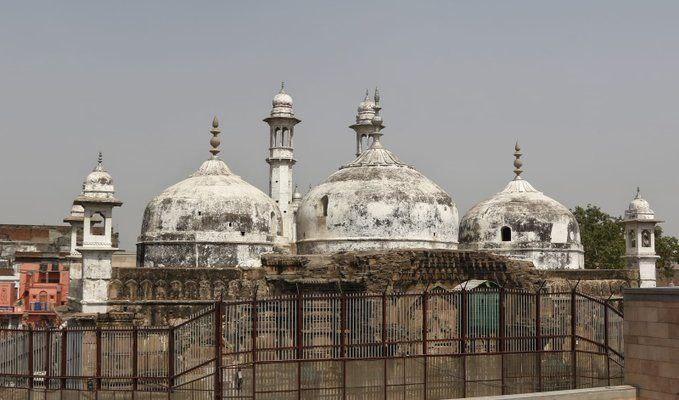
Varanasi: The May 27 congregational prayer at the Gyanvapi Masjid was like any other Friday namaz, refusing to be drawn in the ongoing controversy aimed at hitting at the pluralistic ethos that has kept Hindus and Muslims united for centuries in Varanasi.
A host of mediapersons thronged a tea stall at Chitra Complex, located at Chowk, where members from both the communities were enjoying tea and sharing lighter moments at a stall owned by a Hindu.
When one of the reporters of a private TV channel sought their reaction on the contentious discovery of a purported Shivling during the recent court-monitored survey on the mosque premises, they politely refused to comment and urged the media not to “harm the cherished Ganga-Jamuni tehzeeb of Varanasi”.
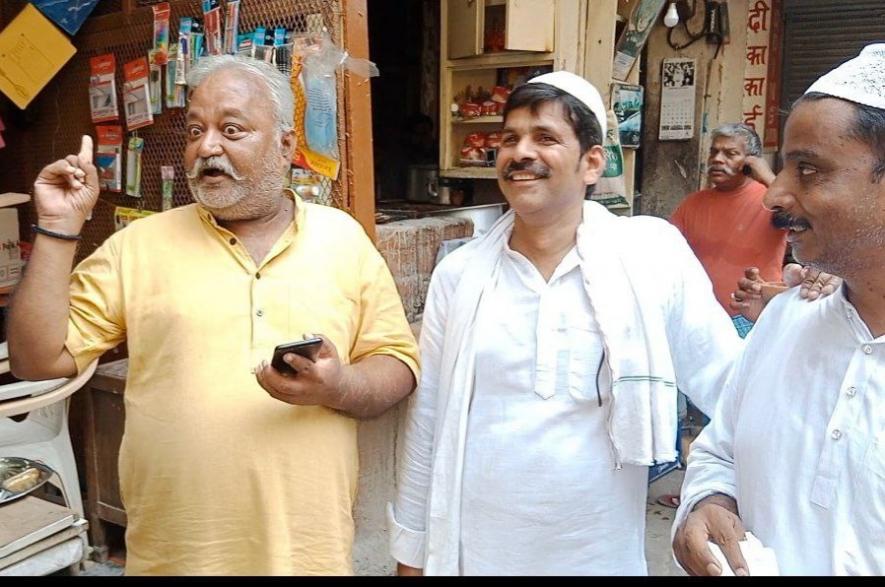
The city of countless temples and mosques is proud of its syncretic Hindu-Muslim culture irrespective of the claims and counterclaims regarding the Kashi Viswanath temple and the Gyanvapi mosque.
“The government and the media have pushed the country into an abyss. Aggressive reporting on the issue suggests that Varanasi is about to witness a communal riot. Merchants are cancelling orders and hotel bookings are getting cancelled. As a result, business is taking a hit,” a visibly angry Deepak Agarwal, the manager of Chitra complex, tells Newsclick.
Varanasi, famous for its Banarasi saris and wooden handicraft, is one of the major business hubs of eastern Uttar Pradesh.
A cell phone accessories dealer at Dal Mandi seconded Agarwal. “The dispute over the Gyanvapi mosque is having ripple effects on business. COVID-19 hit our business hard. As we were recovering from the impact, the fear of communal tension could prove to be the last nail in the coffin,” he said requesting anonymity.
On May 20, the Supreme Court transferred the Gyanvapi mosque suit proceedings from a civil judge to the district Judge of Varanasi saying that a “more senior and experienced judicial officer” is required considering the social complexities of the dispute.
Meesam Siddiqui, who sells mementos, fears that if the court decides the suit to “satisfy the collective conscience of society”, ancient Varanasi would be “lost forever”. “The Ganga-Jamuni tehzeeb seems to have taken a blow with the revival of the temple-mosque dispute,” he says.
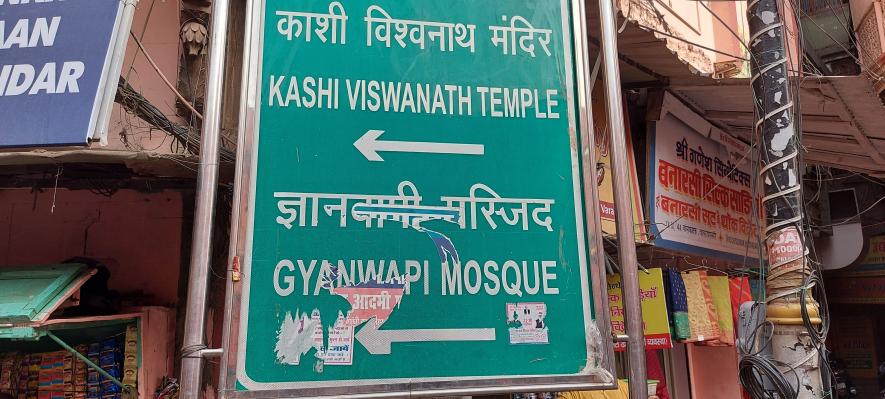
Siddiqui, however, believes that Hindu-Muslim unity is still intact. “The city has not witnessed a communal clash in the recent past. This is the city of Bismillah Khan, who played shehnai at Hindu weddings. This is the city where you will find temples in few Muslim houses. The city still cherishes its communal harmony and tranquillity. Whatever is telecast on TV is not true,” adds the young man.
Varanasi witnessed the first recorded communal violence in 1809 with Holi and Muharram coincidentally falling on the same day. The riot erupted after two large processions of Hindus and Muslims came face to face on the same road and both allegedly refused to give way to each other.
In 1978, riots broke out after Hindus allegedly tried to take out a Durga Puja procession from a predominantly Muslim area. In 1991, two days of communal violence left several dead when Hindu revellers allegedly chanted anti-Muslim slogans during a Kali Puja procession passing through the Muslim-concentrated Madanpura area. Riots jolted the city for the fourth time when the Babri Masjid was demolished on December 6, 1992.
In the subsequent years, minor communal clashes were reported in Varanasi. In 2016, the Lat Bhairava Baraat event resulted in violence but locals said that it was more “political” in nature and sparked by “outsiders”.
Ajay Sharma, the state president of Kendriya Brahman Mahasabha and in charge of the Sanatan Rakshak Dal, feels that the survey findings have provided an opportunity to “correct the historical wrong” though he rejects that it will dent the city’s communal unity.
“I firmly believe that the mosque was constructed after demolishing the Shiv temple. But my Muslim friends still greet me with ‘Har Har Mahadev’ and I reciprocate them with ‘Salam’. The dispute has not at all dented our bond. This is the culture of Kashi. The city has the least communalism compared with the rest of the country,” Sharma says.
Sharma alleges that “communal forces are working overtime to vitiate” the city’s atmosphere. Walking amid mounds of rubble in the heart of Varanasi, he vents anger at the demolition of, at least, 143 ancient temples and around 250 multi-storeyed buildings more than 300 years old for the construction of the Kashi Vishwanath Corridor, which provides devotees easier access to one of the most sacred temples that houses one of the pre-eminent Shivlings in the country.
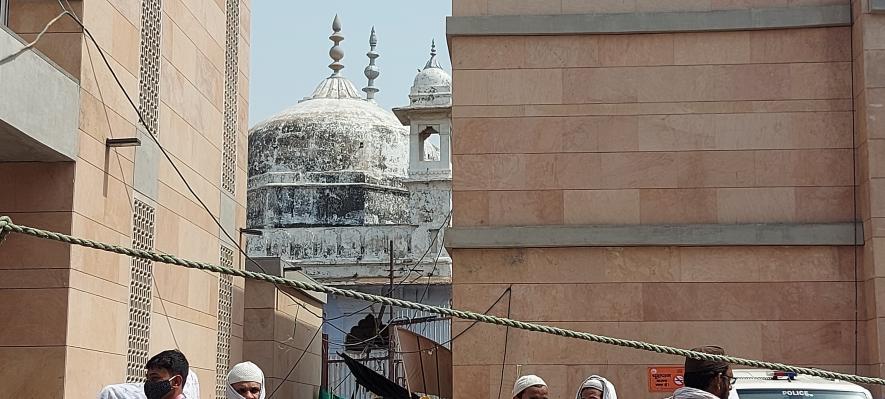
“Faith has always been crushed by terror. If the mosque was forcibly built on the rubbles of the temple, guest houses and toilets were built by demolishing temples on the strength of power in 2021,” Sharma says.
In his late 60s, Raj Kumar Singh, who owns a small tea shop adjacent to the corridor, agrees with Sharma. “Temples have been razed by only two persons—one was Aurangzeb and the other is Modi,” he alleges.
Krishna Kumar Sharma, a devout Brahmin, wonders as to why there is such hullabaloo about the discovery of the purported Shivling when the matter is sub judice. “Let’s wait for the court to decide the different aspects of the case as it is neither Hindus nor Muslims but the people of Varanasi, who are bearing the brunt of the controversy. Their livelihood is getting impacted,” he says.
People who are fomenting communal tensions, Sharma adds, should “answer why the Bharatiya Janata Party (BJP) caused hardships to people by demolishing their houses and business establishments in the name of the Kashi Vishwanath Corridor”. Accusing the administration of destroying and throwing away several idols and Shivlings, he alleges, “This corridor is being built by crushing the soul of Kashi.”
Praising the Ganga-Jamuni tehzeeb, Shakeel Ahmad, who owns a mobile phone accessories shop at Chowk, said that the tradition is not only mentioned during conversations but also “practiced” in daily life. “People here tolerate difference of opinions and embrace diversity.”
Refuting reports trying to “divide” the city’s communal unity,
Ashfaq Ahmad, a devout Muslim who has been offering Namaz at the Gyanvapi mosque five times a day for years, says, “It is being reported everywhere as if there is communal tension in Varanasi. This is being done to divide the 80% and 20% for political reasons. I offer prayer at the mosque five times a day but never faced any problem or objection from anyone. Hindus and Muslims both visit the site to offer prayers in line with their respective faiths.”
Notably, everyone this correspondent spoke to claimed that “only outsiders stand to the benefit from the dispute, not the people of Varanasi”.
“If you check the background of the petitioners (the five women) and the association of their husbands, you will realise what is at the core of the issue. They have direct or indirect association with the ruling BJP or its affiliates,” said a resident at Kashi Karwat Mandir requesting anonymity.
The man claims that not a single incident of communal disharmony will occur due to the strong brotherhood in the city even if all the security at the disputed site is withdrawn. “The heightened security on Fridays is just to grab media attention and create fear psychosis among people,” he alleges.
After the call for Azaan (prayer) was given from the mosque using loudspeakers at the permitted decibel level, imam Maulana Abdul Batin Naumani in his sermon before the prayer described the details of the lawsuit and court proceedings so far and urged the devotees to strictly avoid talking to the media as their statements are “misinterpreted” and telecast “out of proportion”.
“There is no Shivling in wazukhana (the ablution pond). Our stand has been strongly presented in the court by the learned counsels of the mosque committee. We must wait for the court’s judgment. It is better for us to argue in the court of law, not on the streets or before the media,” he said appealing to people to donate generously so that the case can be fought without any financial constraint.
“Suit after suits are being filed across the country seeking demolition of historical mosques, shrines and monuments. You don’t need to worry about anything. We will fight till the last and protect our sacred places. We also urge outsiders not to interfere in the issue but to extend financial support to the committee,” Naumani added.
Intermittent chants of ‘Har Har Mahadev’ echoed in the temple while the Friday sermon and prayers were going on in the mosque.
THE LEGAL BATTLE AT A GLANCE
While the Hindu side claims that the mosque was constructed by Mughal emperor Aurangzeb in 1669 after demolishing a Shiva temple, the Muslim side vehemently opposes the narrative.
The controversy and the legal battle around the mosque are decades old, and the matter is sub judice in a Varanasi trial court, the Allahabad High Court (HC) and the Supreme Court (SC), where a bunch of petitions by different parties are under consideration.
Beginning in 1984, the Vishwa Hindu Parishad and right-wing Hindu nationalist groups affiliated with the Rashtriya Swayamsevak Sangh launched a nation-wide campaign to reclaim the sites of mosques constructed by allegedly demolishing Hindu temples, including the Gyanvapi Masjid.
A first title dispute suit was filed in the Varanasi Civil Court by advocate Vijay Shankar Rastogi in 1991 for handing over the site to the Hindu community. He had claimed illegality in the construction of the Gyanvapi Masjid and sought an archaeological survey of the mosque.
However, in 1998, the HC ruled that the suit was barred by the Places of Worship Act, 1991. Later, a revision petition was moved before the Varanasi District Court, which allowed it and asked the Civil Court to adjudicate the dispute afresh. The Anjuman Intezamia Masjid (the management committee of the mosque) challenged this in the HC, which stayed the proceedings.
Following the 2019 SC verdict in the Babri Masjid-Ram Janmabhoomi dispute, the Gyanvapi case was revived in December of that year. An advocate moved the HC demanding that the mosque complex be surveyed by the Archaeological Survey of India (ASI).
In 2021, five women filed a petition in the Varanasi Civil Court seeking permission to daily worship the deities (Shringar Gauri, Lord Ganesha, Lord Hanuman and Nandi) whose idols were allegedly located on the outer wall of the mosque. The petitioners also sought to refrain the opponents from causing any damage to the idols. Currently, devotees are allowed to worship Shringar Gauri only on the fourth day of the Chaitra Navratri (the first month of the Hindu calendar).
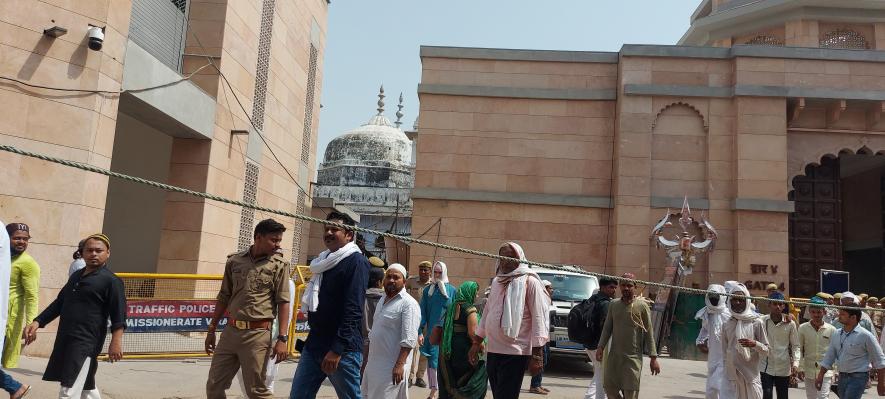
On April 8, 2021, the Civil Court ordered the ASI to conduct the requested survey. In addition, the court ordered the formation of a five-member committee—comprising archaeological experts—with two members from the minority community to determine whether a temple existed at the site prior to the mosque. The Uttar Pradesh Sunni Central Waqf Board (which has the title of the mosque and its land) and the mosque’s managing committee contested the lower court’s order in the HC.
After hearing all the parties involved, the HC on September 9, 2021, ordered an interim stay on the direction to the ASI for conducting the survey. The court said that the Places of Worship Act, 1991 prohibits any change in the religious character of a place of worship from as it existed on August 15, 1947.
On April 26, 2022, the Varanasi Civil Judge (senior division) ordered a survey and videography by the advocate commissioner at the mosque complex. However, the survey was once again opposed by the Anjuman Intezamia Masjid and the Waqf Board. The Muslim side alleged that Ajay Kumar Mishra, the court-appointed commissioner of the survey, tried to do videography from inside the mosque against court permission. It also termed videography inside the mosque a violation of the Places of Worship Act, 1991.
The court, however, refused to remove Mishra. In fact, the court appointed two more commissioners to join the survey of the mosque and directed that it be completed and the report submitted by May 17.
As on May 14, a 54-member team led by Mishra conducted the survey and videography of the basement and the western wall of mosque complex. The remaining survey and videography of the upper part of the complex was reportedly done on May 15 and concluded on May 16.
After it was widely reported that a Shivling was found within the temple-mosque complex, the court ordered to seal the place/area concerned. The court also directed the district magistrate, the police commissioner and the commandment of the Central Reserve Police Force in Varanasi to ensure the protection of the sealed place.
Giving a new twist to the turn of events, Mishra was later removed by the court for allegedly taking a private camera person with him to the complex and leaking confidential information to the media.
In a related development in the case on May 17, a Bench of the SC comprising Justices DY Chandrachud and PS Narasimha heard a petition filed by the Ajnuman Intezamia Masjid challenging the orders passed by the Civil Court for a survey of the mosque on a suit filed by a few Hindu devotees.
The top court ordered the Varanasi district magistrate to ensure the area where the purported Shivling was found is protected without obstructing the Muslim community’s right to worship.
Subsequently, the case was transferred to the District Court Judge, who was directed by the SC to decide the maintainability of the suit after the controversy surrounding the alleged findings of the survey was leaked into the public domain. The hearing in the District Court has been posted on July 4.
After the Friday prayer concluded at Gyanvapi Masjid amid heavy security, barricades and manual frisking, the group of Muslim and Hindu businessmen that had gathered at the tea stall symbolised the communal unity and harmony of the city despite the media hype about the disputed site and disinformation on no visible discord.
Get the latest reports & analysis with people's perspective on Protests, movements & deep analytical videos, discussions of the current affairs in your Telegram app. Subscribe to NewsClick's Telegram channel & get Real-Time updates on stories, as they get published on our website.
























